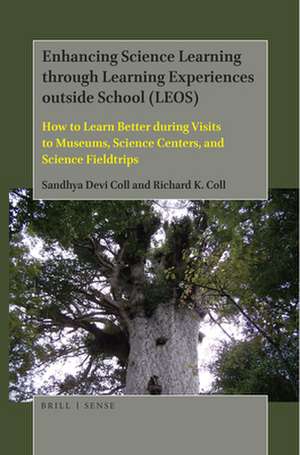Enhancing Science Learning through Learning Experiences outside School (LEOS): How to Learn Better during Visits to Museums, Science Centers, and Science Fieldtrips
Autor Sandhya Devi Coll, Richard K. Collen Limba Engleză Paperback – 25 sep 2019
Preț: 305.42 lei
Nou
Puncte Express: 458
Preț estimativ în valută:
58.46€ • 63.52$ • 49.14£
58.46€ • 63.52$ • 49.14£
Carte indisponibilă temporar
Doresc să fiu notificat când acest titlu va fi disponibil:
Se trimite...
Preluare comenzi: 021 569.72.76
Specificații
ISBN-13: 9789004411753
ISBN-10: 9004411755
Dimensiuni: 155 x 235 mm
Greutate: 0.23 kg
Editura: Brill
Colecția Brill
ISBN-10: 9004411755
Dimensiuni: 155 x 235 mm
Greutate: 0.23 kg
Editura: Brill
Colecția Brill
Cuprins
Foreword
David F. Treagust
About the Cover
List of Figures and Tables
Chapter 1: Enhancing Science Learning
Chapter Overview
Introduction
Educational Context
Research in LEOS
Structure and Organization of the Book
Assumptions and Terms Used in LEOS Writing and Literature
Chapter 2: Formal, Informal, Non-Formal Learning & Free-Choice Learning
Chapter Overview
Introduction
Theories of Learning
Behaviorist Theories of Learning
Constructivism
Social Constructivism
Sociocultural Theories of Learning
Types of Learning
Formal Learning
Non-Formal Learning
Informal Learning
Chapter 3: Learning Experiences outside School
Chapter Overview
Introduction
Ways by Which LEOS May Be Facilitated
Learning Environments and LEOS
LEOS: Implications for School Science
Chapter 4: The Learner-Integrated Field Trip Inventory (LIFTI)
Chapter Overview
Introduction
Learner-Integrated Field Trip Inventory (LIFTI)
Chapter 5: Integrating Formal, Informal and Non-Formal Learning Using the Digitally-Integrated Fieldtrip Inventory (DIFI)
Chapter Overview
Introduction
Blended Learning
The Digitally-Integrated Fieldtrip Inventory (DIFI)
Chapter 6: Learning Biological Sciences via Learning Experiences outside School
Introduction
Biological Sciences
Reflections and Conclusions
Chapter 7: Learning Chemical Sciences via Learning Experiences outside School
Introduction
Chemical Sciences
Reflections and Conclusions
Chapter 8: Learning Earth & Space Sciences via Learning Experiences outside School
Introduction
Earth & Space Sciences
Reflections and Conclusions
Chapter 9: Learning Physical Sciences via Learning Experiences outside School
Introduction
Physical Sciences
Reflections and Conclusions
Appendix: The New Zealand Curriculum and Science Curriculum
Index
David F. Treagust
About the Cover
List of Figures and Tables
Part 1: What Research Has to Tell Teachers about Learning Experiences outside School (LEOS)
Chapter 1: Enhancing Science Learning
Chapter Overview
Introduction
Educational Context
Research in LEOS
Structure and Organization of the Book
Assumptions and Terms Used in LEOS Writing and Literature
Chapter 2: Formal, Informal, Non-Formal Learning & Free-Choice Learning
Chapter Overview
Introduction
Theories of Learning
Behaviorist Theories of Learning
Constructivism
Social Constructivism
Sociocultural Theories of Learning
Types of Learning
Formal Learning
Non-Formal Learning
Informal Learning
Chapter 3: Learning Experiences outside School
Chapter Overview
Introduction
Ways by Which LEOS May Be Facilitated
Learning Environments and LEOS
LEOS: Implications for School Science
Chapter 4: The Learner-Integrated Field Trip Inventory (LIFTI)
Chapter Overview
Introduction
Learner-Integrated Field Trip Inventory (LIFTI)
Chapter 5: Integrating Formal, Informal and Non-Formal Learning Using the Digitally-Integrated Fieldtrip Inventory (DIFI)
Chapter Overview
Introduction
Blended Learning
The Digitally-Integrated Fieldtrip Inventory (DIFI)
Part 2: The Practice of Learning Experiences outside School
Chapter 6: Learning Biological Sciences via Learning Experiences outside School
Introduction
Biological Sciences
Reflections and Conclusions
Chapter 7: Learning Chemical Sciences via Learning Experiences outside School
Introduction
Chemical Sciences
Reflections and Conclusions
Chapter 8: Learning Earth & Space Sciences via Learning Experiences outside School
Introduction
Earth & Space Sciences
Reflections and Conclusions
Chapter 9: Learning Physical Sciences via Learning Experiences outside School
Introduction
Physical Sciences
Reflections and Conclusions
Appendix: The New Zealand Curriculum and Science Curriculum
Index
Recenzii
"The need to enhance the quality of the learning of science that takes place in formal educational contexts (schools) is now recognised world-wide. The value of other contexts as such- for example, museums, zoos, botanical gardens, and computer-based access to these- are gradually being identified and their contribution to the learning in formal contexts established. At the same time, the descriptors of the learning that may take place- free-choice, non-formal, informal – are being refined. This plethora of opportunities places great demands on science teachers, who have to address definite learning objectives in particular subjects –normally physics, chemistry, biology, earth science- and with specific groups of students. This volume gives practical advice, based on research, to teachers on how this may best be done. By using that advice, teachers will most effectively prepare students for the multi-model world in which the social media play an increasing part."
- John K. Gilbert, Professor Emeritus, The University of Reading
- John K. Gilbert, Professor Emeritus, The University of Reading
Notă biografică
Sandhya Devi Coll, Ph.D., works for the World Health Organization as a Technical Officer, promoting national health education. She is a passionate and highly experienced secondary school science teacher. Her research focusses on innovative use of digital technologies to enhance learning outside schools.
Richard K. Coll, Ph.D., Sc.Ed.D., is Deputy Vice-Chancellor - Education at The University of the South Pacific. He has authored more than 250 scholarly articles. His research focusses on cooperative and science education.
Richard K. Coll, Ph.D., Sc.Ed.D., is Deputy Vice-Chancellor - Education at The University of the South Pacific. He has authored more than 250 scholarly articles. His research focusses on cooperative and science education.
